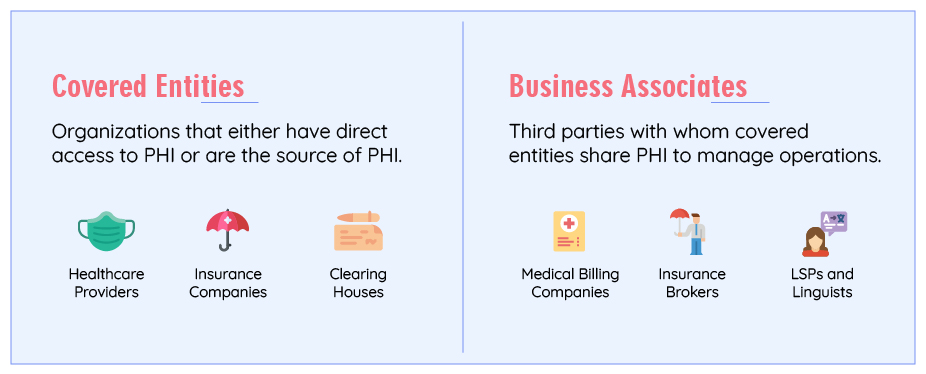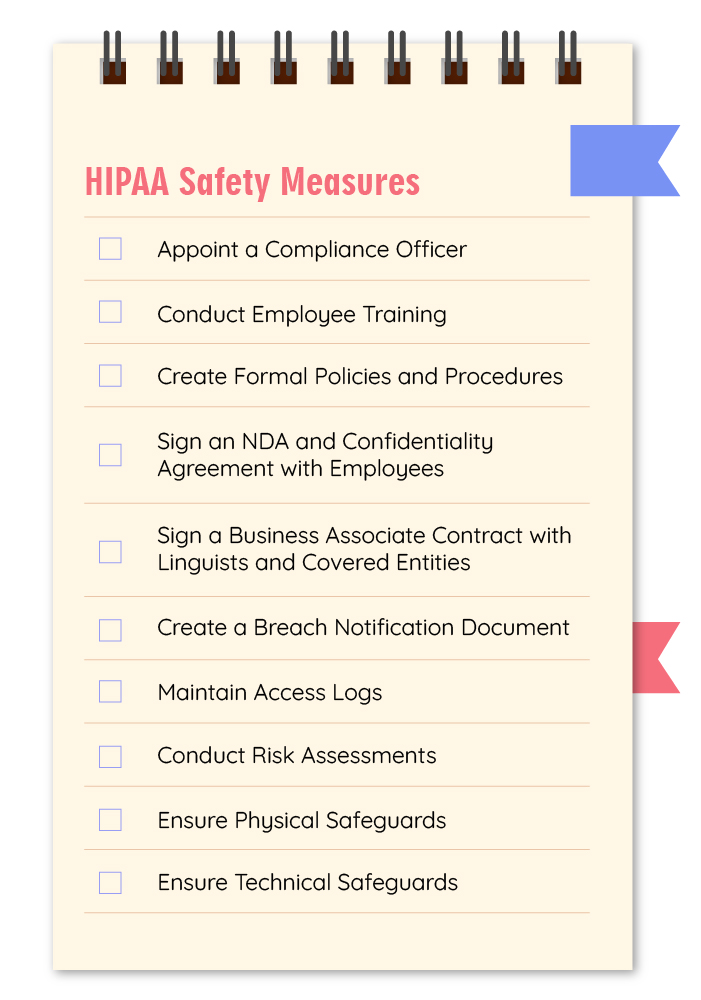When you approach a language service provider (LSP) for language services, you may need to share content that contains sensitive information. This is especially the case if you need language services for information related to third parties, such as your company’s clients. Without the right safeguards in place, you stand to compromise proper data handling and privacy.
While data privacy is especially important for healthcare information, it’s essential you choose an LSP that can guarantee appropriate handling regardless of the type of content. Fortunately, an LSP’s compliance with the Health Information Portability and Accountability Act (HIPAA) guidelines can be instrumental in ensuring there are no lapses.
What is HIPAA?
HIPAA is a federal law in the United States that was enacted in 1996 with the intent of strengthening the privacy and security of an individual’s sensitive health information. Such information is officially referred to as Protected Health Information (PHI) or Electronic Protected Health Information (ePHI) if it is in electronic form. PHI is any individually identifiable information about a person’s health condition. This can include patient reports, diagnoses, consultations, etc. through any medium including emails, text messages, phone calls, in-person meetings, letters, and more.
The act’s two main objectives are addressed through the following rules:
HIPAA Privacy Rule: To ensure that PHI is protected from a people’s standpoint. That is an organization’s clients, staff, and partners.
HIPAA Security Rule: A federal mandated, minimum amount of security to ensure the confidentiality, integrity, and availability of all ePHI that is created, received, maintained, or transmitted by an organization.
Who is covered under HIPAA?
An individual’s PHI may be created or accessed by healthcare providers, insurance companies, and clearinghouses all categorized as Covered Entities. For the smooth flow of operations, covered entities often need to disclose PHI to medical billing companies, insurance brokers, LSPs, and other third parties known as Business Associates. The role of HIPAA is to regulate the use and disclosure of the PHI by both types of organizations.

Building Trust: How is HIPAA relevant to the language services industry
When it comes to language services, a HIPAA compliant company will have the necessary safeguards to ensure complete data security and confidentiality not only for PHI but for any information shared by the client for translation.
An LSP, in this case, would be considered a Business Associate and would be bound to protect the privacy and security of the PHI shared with them. They would need to adopt the necessary safeguards as prescribed by HIPAA, including working with other Business Associates that follow the same guidelines.
For example, if a healthcare provider requires a blood report to be translated for a patient. They should reach out to an LSP that follows HIPAA standards by ensuring that their third party agents or Business Associates such as translators and linguists are trained and bound by appropriate contracts to protect PHI.
What measures should an LSP take to protect information?
As discussed earlier, two aspects need to be taken care of – data security and data privacy. To achieve that, here are the mandatory measures a HIPAA compliant LSP needs to adopt:
- Appoint a Compliance Officer: A trained individual from the organization must be designated to enforce HIPAA standards, and report any issues or breaches in compliance.
- Conduct Employee Training: All employees with access to PHI must undergo training that outlines the measures they need to take to protect PHI. The training should include HIPAA security safeguards for IT and infrastructure and business associate safeguards for client-facing teams and individuals. All employees must be trained again after two years or when the regulations change.
- Create Formal Policies and Procedures: These are documents and procedures that clearly outline how PHI will be protected, including contracts and agreements.
- Sign an NDA and Confidentiality Agreement with Employees: The LSP must ensure all employees in contact with PHI sign an NDA and/or a confidentiality agreement that limits the disclosure of any PHI.
- Sign a Business Associate Contract with Linguists and Covered Entities: The LSP must be prepared to sign a Business Associate contract with any Covered Entity it works with as well as take responsibility to ensure that their vendors or linguists also sign a similar contract to protect PHI.
- Create a Breach Notification Document: The LSP must have a procedure in place to document a reported breach in HIPAA compliance.
- Maintain Access Logs: A log must be maintained to record when PHI was accessed, for what purpose, and by whom.
- Conduct Risk Assessments: The LSP must conduct regular risk assessments to prevent any future breach in compliance.
- Ensure Physical Safeguards: Physical safeguards that help protect access to PHI must be in place. This means computer servers should have limited physical access and should be stored in a locked room. All physical PHI should be locked and in fire-safe storage. Electronic devices containing ePHI should only be used by the individual they’ve been assigned to.
- Ensure Technical Safeguards: The LSP must take the necessary measures to protect ePHI that can be accessed or transmitted via electronic devices and IT networks. All computer systems should be password protected. All PHI access should be logged, and access should be controlled. Data should be encrypted, and the necessary firewalls should be in place.
Here’s a checklist to refer to while selecting a HIPAA compliant LSP:

What should you do if you feel your data has been compromised?
If you think your data has been misused or disclosed unlawfully, please get in touch with your LSP immediately. The HIPAA compliance officer should be able to share the access logs with you and will fill out a breach notification report to further examine the issue.
Finding the right, HIPAA compliant LSP
A HIPAA compliant LSP will clearly document safety measures that it takes to safeguard PHI. This information should be available on the company’s website. Translate By Humans is a HIPAA compliant LSP specialising in HIPAA compliant medical translation and medical interpretation, especially in industries like medical devices and clinical trials. We employ trained employees and business associates who are bound by NDAs and Business Associate contracts to adhere to the HIPAA compliance norms at all times. This means any PHI you share with us is protected from misuse, theft, and unlawful disclosure.


